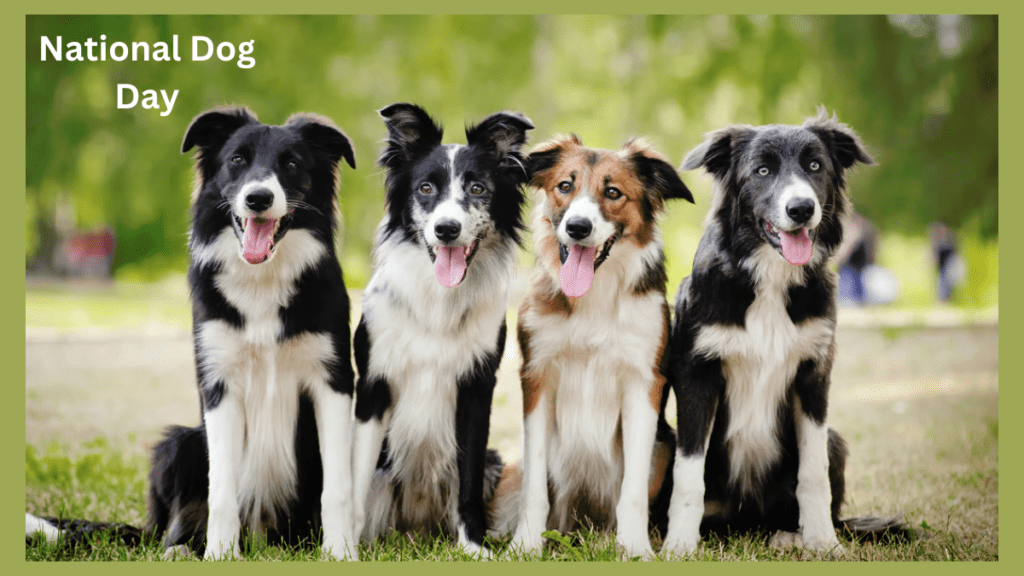National Dog Day celebrated annually on August 26th, holds profound importance in acknowledging the role of dogs in our personal lives. It serves as a platform for diverse dog-related charities and pet welfare enthusiasts to illuminate the challenges faced by abused and neglected dogs.

Additionally, the day is dedicated to honoring the relentless commitment of service dogs who selflessly serve humanity. Established in 2004, this holiday has garnered widespread recognition due to its inclusive appeal.
Statistics indicate that around 57% of the global populace are pet owners, with dogs being the chosen companions for approximately 33% among them.
The Genesis of National Dog Day Colleen Paige, an author and animal behaviorist, laid the foundation for this observance in 2004. Beyond expressing gratitude for dogs, the initiative aims to raise awareness about the plight of mistreated canines, halt the existence of puppy mills, and challenge breed-specific legislation aimed at reducing dog-related incidents.
Since its inception, the significance of National Dog Day has evolved. Many now utilize it as an opportunity to acknowledge their personal pets’ significance or celebrate the accomplishments of service dogs.
A Historical Insight into Dogs as Companions Traditionally, the connection between humans and wolves was believed to have emerged roughly 15,000 years ago in the Middle East. However, recent research, including the 2015 study by Swedish geneticist Pontus Skoglund published in the journal Current Biology, has reshaped this timeline. The study, which examined a 35,000+ year-old Siberian wolf bone, suggested that wolf domestication likely transpired between 27,000 and 40,000 years ago.
Various studies concerning dog genetics suggest that dogs likely originated in Eastern Europe, China, and the Middle East. In western Eurasia, gray wolves were domesticated by humans, while similar processes took place in Asia. Intriguingly, it was wolves that initiated the process of domestication.
Attracted by leftover food at human camps, wolves began to trail nomadic human groups. Over time, these wolves grew more accustomed to humans, and some humans likely embraced them as companions.
As the bond between humans and dogs deepened over generations, scientists estimate that the domestication of canines takes about eight generations, equating to 40 to 80 years. This suggests that within this time span, following the adoption of wolves as pets by humans, they eventually evolved into domesticated dogs.
Captivating Canine Insights Delve into fascinating dog-related facts that offer insight into these cherished animals:
- Unique Nose Prints: Similar to human fingerprints, a dog’s nose print is distinctive. The Canadian Kennel Club has recognized this uniqueness and employed it for identification since 1938.
- Sleep Patterns: Recent studies indicate that nearly 45% of dog owners share their sleeping space with their canine companions. Other dogs find rest in diverse spots, including dog beds, crates, and even outdoor shelters.
- The Legacy of Rin Tin Tin: Rin Tin Tin, a renowned dog, played a pivotal role in rescuing Warner Bros from financial distress. The journey of Rin Tin Tin from a war-affected environment to Hollywood underscores the extraordinary bond between humans and dogs.
Celebrating National Dog Day Marking National Dog Day involves a range of meaningful gestures. Individuals can dedicate their time and resources to support dog welfare organizations, aiding displaced and vulnerable dogs. Commemorating the day with personal pets by offering toys or clothing is also a popular choice.
However, the most heartfelt approach to celebrating the occasion is by spending quality time with one’s faithful companion. Dogs offer unwavering affection, seeking nothing more than care, love, and time in return—a sentiment that deserves wholehearted embrace.